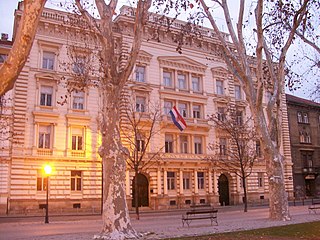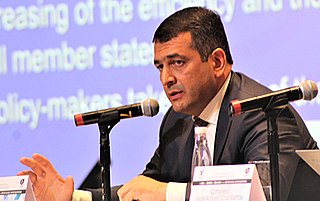Bo Vesterdorf (born 1945) is a former Danish judge who has been President of the European Court of First Instance.
Since late 2008 Vesterdorf has been a Consultant in the Competition practice at Herbert Smith Freehills.
Vesterdorf began his career as a lawyer-linguist at the European Court of Justice before becoming Administrator in the Danish Ministry of Justice, examining magistrate, and Legal Attaché in the Permanent Representation of Denmark to the European Communities.
He was a Temporary Judge at the Østre Landsret (Danish Court of Appeal), Head of the Constitutional and Administrative Law Division in the Ministry of Justice, Director of the Administration Department in the Ministry of Justice, and a university lecturer. He also served as a member of the Steering Committee on Human Rights at the Council of Europe, and subsequently as a member of its Bureau. In 2004 he became a member of the "Ad hoc committee on judicial training" at the Academy of European Law, Trier, Germany. He was a judge at the European Court of First Instance from 25 September 1989 and its president from 4 March 1998 to 17 September 2007.
Vesterdorf has been Commander 1st Degree of the Danish Royal Order of the Dannebrog since 20 June 2006. On 1 November 2007 he was appointed Senior Legal Consultant at Plesner Law Firm in Copenhagen. He is an external fellow at University College London's Faculty of Law and is attached to St Gallen University, Switzerland and Fordham Law School, New York. In May 2008 he was made Doctor of Laws honoris causa by St Gallen University.

Impeachment is a process by which a legislative body or other legally constituted tribunal initiates charges against a public official for misconduct. It may be understood as a unique process involving both political and legal elements.

The European Court of Justice (ECJ), formally just the Court of Justice, is the supreme court of the European Union in matters of European Union law. As a part of the Court of Justice of the European Union, it is tasked with interpreting EU law and ensuring its uniform application across all EU member states under Article 263 of the Treaty of the Functioning of the European Union (TFEU).

The Courts of Denmark is the ordinary court system of the Kingdom of Denmark. The Courts of Denmark as an organizational entity was created with the Police and Judiciary Reform Act taking effect 1 January 2007 which also significantly reformed the court system e.g. by removing original jurisdiction from the High Courts and by introducing a new jury system.

The Judiciary of Russia interprets and applies the law of Russia. It is defined under the Constitution and law with a hierarchical structure with the Constitutional Court and Supreme Court at the apex. The district courts are the primary criminal trial courts, and the regional courts are the primary appellate courts. The judiciary is governed by the All-Russian Congress of Judges and its Council of Judges, and its management is aided by the Judicial Department of the Supreme Court, the Higher Qualification Board of Judges, and the Ministry of Justice, and the various courts' presidents. And although there are many officers of the court, including jurors, the Prosecutor General remains the most powerful component of the Russian judicial system.

Peter Tomka is a Slovak judge of the International Court of Justice. Prior to his election to the ICJ in 2003, Tomka was a Slovak diplomat.

John Mercer Walker Jr. is a senior United States circuit judge of the United States Court of Appeals for the Second Circuit. He served as chief judge from September 30, 2000, to September 30, 2006, when he assumed senior status. He was a United States district judge of the United States District Court for the Southern District of New York, appointed in 1985 by President Ronald Reagan before being elevated to the Second Circuit in 1989.

Theodor Meron, is an American-Israeli lawyer and judge. He served as a judge of the International Criminal Tribunal for the former Yugoslavia (ICTY), International Criminal Tribunal for Rwanda (ICTR), and the International Residual Mechanism for Criminal Tribunals (Mechanism). He served as President of the ICTY four times and inaugural President of the Mechanism for three terms (2012–19).

The judicial system of Turkey is defined by Articles 138 to 160 of the Constitution of Turkey.

There are various levels of judiciary in England and Wales—different types of courts have different styles of judges. They also form a strict hierarchy of importance, in line with the order of the courts in which they sit, so that judges of the Court of Appeal of England and Wales are given more weight than district judges sitting in county courts and magistrates' courts. On 1 April 2020 there were 3,174 judges in post in England and Wales. Some judges with United Kingdom-wide jurisdiction also sit in England and Wales, particularly Justices of the United Kingdom Supreme Court and members of the tribunals judiciary.
Sir William James Lynton Blair is a British retired judge. He was previously a Queen's Counsel at London barristers' chambers 3 Verulam Buildings, specialising in domestic and international banking and finance law. He is the elder brother of Sir Tony Blair, the former British prime minister.

The Judiciary of the Czech Republic is set out in the Constitution, which defines courts as independent institutions within the constitutional framework of checks and balances.

The Government of Thailand, or formally the Royal Thai Government, is the unitary government of the Kingdom of Thailand. The country emerged as a modern nation state after the foundation of the Chakri Dynasty and the city of Bangkok in 1782. The Revolution of 1932 brought an end to absolute monarchy and replaced it with a constitutional monarchy.
Carl Baudenbacher is a Swiss jurist. He has served as a judge of the EFTA Court from September 1995 to April 2018 and was the court's president from 2003 to 2017. He was a full professor at the University of St. Gallen from 1987 to 2013 and a permanent visiting professor at the University of Texas at Austin School of Law from 1993 to 2004.
Sir Gerald Gray Fitzmaurice was an English barrister and judge. He was a member of the Permanent Court of Arbitration between 1964 and 1973 and a Judge of the International Court of Justice between 1960 and 1973, before becoming a Judge of the European Court of Human Rights at Strasbourg in 1974.

Roger John Laugharne Thomas, Baron Thomas of Cwmgiedd, FLSW is a British judge. He served as Lord Chief Justice of England and Wales from 2013 to 2017.

The Law School of the Aristotle University of Thessaloniki is considered one of the most prestigious Greek law schools.

Nihal Mahendra Sudrikku Jayawickrama is a Sri Lankan academic. He was the former Permanent Secretary to the Ministry of Justice (1970–1977), Professor of Law at University of Hong Kong (1984–1997), Ariel F Sallows Professor of Human Rights at the University of Saskatchewan, Canada (1992–1993), and Executive Director of Transparency International (1997–2000). He is now an independent legal consultant, and has been the Coordinator of the UN-sponsored Judicial Integrity Group since 2000.

The judiciary of Croatia is a branch of the Government of Croatia that interprets and applies the laws of Croatia, to ensure equal justice under law, and to provide a mechanism for dispute resolution. The legal system of Croatia is a civil law system, historically influenced by Austrian, Hungarian and Yugoslav law, but during the accession of Croatia to the European Union, the legal system was almost completely harmonised with European Union law. The Constitution of Croatia provides for an independent judiciary, led by a Supreme Court and a Constitutional Court. The Ministry of Justice handles the administration of courts and judiciary, including paying salaries and constructing new courthouses. It also administers the prison system.

Katarina Barley is a German politician and lawyer who has been a Member of the European Parliament since 2019, serving as one of its Vice-Presidents. She served as Federal Minister of Justice and Consumer Protection in the fourth Cabinet of Angela Merkel. Prior to that, she had served as Federal Minister of Family Affairs, Senior Citizens, Women and Youth and, from 28 September 2017, as the acting Federal Minister of Labour and Social Affairs, both until 14 March 2018.

Ramin Afad oglu Gurbanov (Garagurbanlı) is an Azerbaijani lawyer, scholar, and the current president of the European Commission for the Efficiency of Justice (CEPEJ) of the Council of Europe. He is also a judge of the Baku Court of Appeal, a member of the Management Board of the Union of Associations of Judges of the Republic of Azerbaijan, and the Head of the Department of International Law of the Institute of Law and Human Rights at the Azerbaijan National Academy of Sciences. He is a Doctor of Law and Professor of the Department of Civil Law Disciplines at the Russian University of Economics.